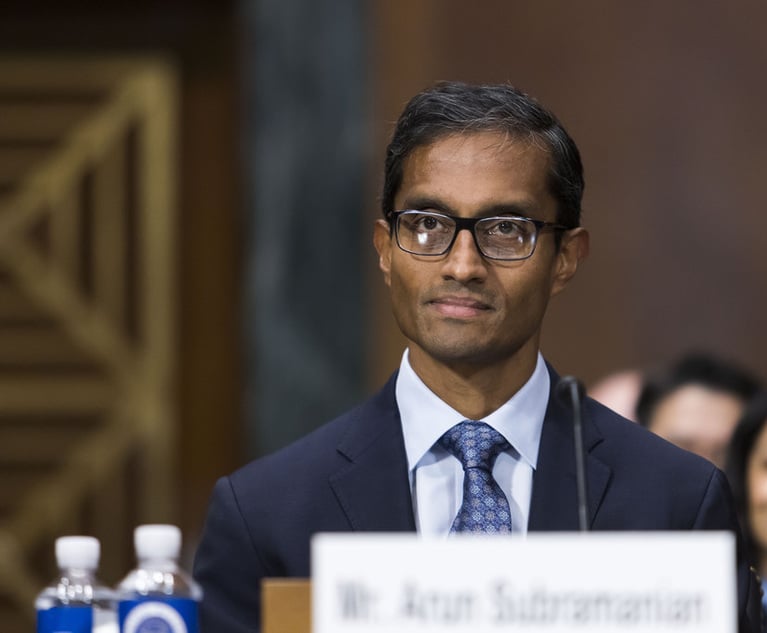Next for America's Nursing Homes: A Legal Pandemic
Law professors warn their students that bad facts make bad law. Historically, courts have been skeptical that the government can hold a nursing home liable for fraud based on a theory that its services were so subpar as to be effectively worthless.
June 29, 2020 at 11:13 AM
8 minute read
 William J. Harrington and Annie E. Railton
William J. Harrington and Annie E. RailtonLaw professors warn their students that bad facts make bad law. Historically, courts have been skeptical that the government can hold a nursing home liable for fraud based on a theory that its services were so subpar as to be effectively worthless. But a confluence of two factors – the COVID-19 pandemic and government enforcement initiatives—portend the likely softening of this skepticism.
Even before COVID-19 had taken hold, the U.S. DOJ announced an enforcement focus on nursing homes, including False Claims Act (FCA) cases against those that fail to deliver adequate services to care for their residents.
Then COVID-19 ravaged America's nursing homes: last month, the New York Times reported that nursing home residents or workers accounted for more than a third of all coronavirus deaths in the United States, with the virus having infected more than 153,000 individuals at some 7,700 facilities.
As the death toll has grown, Congress and multiple state entities have announced investigations specifically looking at COVID-19 issues in nursing homes.
This is fertile ground for developments in the law of "worthless services" unfavorable to nursing homes.
False Claims Actions Premised on a 'Worthless Services' Theory
The government initiatives looking at nursing homes will no doubt uncover instances that fit into traditional FCA frameworks: entities that billed Medicare or Medicaid for services they never provided or that billed for provided services that were medically unnecessary.
But the reports of systemic failures at nursing homes suggest the DOJ may turn to the more aggressive theory that these facilities provided so-called "worthless" services—that is, services which are so insufficient that they provide no value to the government at all, rendering claims for reimbursement by Medicare or Medicaid false. For example, federal law provides that a "nursing facility must care for its residents in such a manner and in such an environment as will promote maintenance or enhancement of the quality of life of each resident." 42 U.S.C. § 1396r(b)(1)(A). One could argue this provision sets a standard for resident care and that a significant departure from the standard renders the services worthless. The consequences of such liability are severe: if the services were entirely worthless, actual damages equal the entire value of the claims, and the government can recoup treble damages under the FCA's penalty provisions.
Though case law in this area is scarce, historically nursing homes enjoyed strong defenses in such investigations. Courts have imposed a high bar as to when service insufficiencies rise to the level of being "worthless" for FCA purposes. In Absher v. Momence Meadows Nursing Center, the lead circuit court decision addressing "worthless services" in the nursing home context, the relators—former nurses at Momence's 140-bed long-term care facility—argued at trial that Momence had provided worthless services to Medicare and Medicaid patients by failing to prevent infections, control pests, manage pressure sores, provide correct medications, prevent accidents, and prevent staff abuse of residents. 764 F.3d 699 (7th Cir. 2014). The jury found Momence liable, concluding that it submitted nearly 2,000 false claims, and the district court entered judgment in the amount of $9 million after trebling the damages.
The U.S. Court of Appeals for the Seventh Circuit reversed the verdict, holding that the defendants were entitled to judgment as a matter of law because no reasonable jury could have found that Momence provided "truly or effectively worthless nursing services to its residents." As the court explained, "the performance of the service [must be] so deficient that for all practical purposes it is the equivalent of no performance at all. It is not enough to offer evidence that the defendant provided services that are worth some amount less than the services paid for."
The court also noted that Momence was allowed to continue operating and rendering services despite regular visits by government surveyors, who it said would have noticed if the facility effectively provided no care.
More recently, the Eastern District of Pennsylvania applied similar legal principles. In Jackson v. DePaul Health System, the court rejected relator's argument that the defendant's 120-bed nursing facility provided worthless services due to insufficient supplies, staffing shortages, and four exemplar incidents involving residents. Citing Absher, the Jackson court held that to be worthless, "the provision of services must be so substandard as to be tantamount to no service at all." 2020 WL 1875608 (E.D. Pa. Apr. 15, 2020). Noting that no court of appeals has yet opined on where the line is drawn between substandard and "worthless" services, the Jackson court took the position that it should be drawn when there is "gross negligence in complying with standard of care regulations," i.e., services are worthless when they are provided "without even slight care." Following that standard, the care the defendant nursing home provided to its residents was not "worthless," because residents had been treated when issues had arisen, which constituted "at least slight care to the promotion of quality of life."
The Jackson court also found that even if the incidents were representative of a more widespread problem, the facility's conduct did not rise to gross negligence, including because the facility had processes for ensuring sufficient staffing, procuring supplies, and obtaining resident feedback, and because—like in Absher—inspections did not reveal any "immediate jeopardy" deficiencies that warranted disqualification.
Intense Government Scrutiny on Nursing Homes
Current regulatory warnings suggest that FCA litigation against nursing homes is likely. They also suggest that future litigants may struggle to build a defense based on government inaction, which was a helpful fact for the nursing homes in both Absher and Jackson.
At a late February speech at the Federal Bar Association's Qui Tam conference, Jody Hunt, assistant attorney general for the DOJ Civil Division, identified improper care and billing at nursing homes as one of the DOJ's top 2020 healthcare enforcement priorities. In short order, a March 3, DOJ press release announced the launch of a National Nursing Home Initiative focusing on civil and criminal efforts to pursue facilities that provide "grossly substandard care" to their residents, adding that DOJ was already investigating approximately 30 individual nursing facilities in nine states.
COVID-related investigations may discover instances of substandard care that led to the death of residents. On June 16, spurred by reports of widespread infections in nursing homes and long-term care facilities, Congress announced an investigation into the COVID-19 crisis in nursing homes. The investigation, led by the Select Subcommittee on the Coronavirus Crisis, reportedly seeks documents and information from the Centers for Medicare and Medicaid Services about its oversight and regulatory enforcement, and from five national for-profit nursing home companies about COVID-19 cases and deaths, testing, PPE, staffing levels and pay, legal violations, efforts to prevent further infections, and the use of federal funds during the pandemic.
State governments have added to this scrutiny. On May 6, New Jersey Gov. Phil Murphy announced plans to conduct a "rapid review" of the state's 575 long-term care facilities, focused not only on mitigating COVID-19 risks but also on identifying potential state or federal actions. On May 12, the Pennsylvania Attorney General's Office announced that several of the state's nursing homes were under criminal investigation, after the office had received complaints about neglect. Other states, including New York and Massachusetts, have also launched investigations into nursing home facilities as a result of COVID-19 outbreaks.
COVID-19 May Alter Judicial Judgments as to Negligence
In past worthless services cases, regulatory inaction was a helpful fact for nursing homes seeking to defend themselves. The current environment suggests that such defenses may no longer be available.
Another unknown is how the "worthless services" analysis will be shaped by collective experience of the COVID-19 pandemic and, in particular cases, bad facts involving widespread COVID-19 deaths at a facility. Courts inevitably bring their own judgment and experience to bear on what constitutes negligence or expected performance when analyzing new cases. The pandemic has altered collective views about reasonable precautions, and an environment of stricter regulatory enforcement can also sway how judges see an institution's performance.
The Jackson court, for example, acknowledged the possibility that gross negligence—and thus worthless services—could be found where there is evidence of pervasive issues such that a reasonable inference of significantly substandard care could be drawn. In this environment, widespread sickness and mortality at a nursing home might provide the groundwork for a successful worthless services argument.
However the law develops, many more nursing homes and skilled nursing facilities will grapple with this legal question. Before they do, they should examine existing cases and regulatory guidance for steps they can take to mitigate their risk. This includes steps that prior entities have cited to rebut worthless services claims, including active and robust compliance plans and practices, the prompt handling of any complaints, and the attentive response to government standard-of-care guidance.
William Harrington and Annie Railton are partners at Goodwin in New York and Tucker DeVoe is an associate in Boston.
This content has been archived. It is available through our partners, LexisNexis® and Bloomberg Law.
To view this content, please continue to their sites.
Not a Lexis Subscriber?
Subscribe Now
Not a Bloomberg Law Subscriber?
Subscribe Now
NOT FOR REPRINT
© 2025 ALM Global, LLC, All Rights Reserved. Request academic re-use from www.copyright.com. All other uses, submit a request to [email protected]. For more information visit Asset & Logo Licensing.
You Might Like
View All
Decision of the Day: Commercial Division Finds Defendant Engaged in Unfair Competition Against Plaintiff

Decision of the Day: Court Rules on Judgment Motions Over Police Killing of Pet Dog While Executing Warrant

Decision of the Day: JFK to Paris Stowaway's Bail Revocation Explained

Decision of the Day: Judge Dismisses Defamation Suit by New York Philharmonic Oboist Accused of Sexual Misconduct
Trending Stories
Who Got The Work
J. Brugh Lower of Gibbons has entered an appearance for industrial equipment supplier Devco Corporation in a pending trademark infringement lawsuit. The suit, accusing the defendant of selling knock-off Graco products, was filed Dec. 18 in New Jersey District Court by Rivkin Radler on behalf of Graco Inc. and Graco Minnesota. The case, assigned to U.S. District Judge Zahid N. Quraishi, is 3:24-cv-11294, Graco Inc. et al v. Devco Corporation.
Who Got The Work
Rebecca Maller-Stein and Kent A. Yalowitz of Arnold & Porter Kaye Scholer have entered their appearances for Hanaco Venture Capital and its executives, Lior Prosor and David Frankel, in a pending securities lawsuit. The action, filed on Dec. 24 in New York Southern District Court by Zell, Aron & Co. on behalf of Goldeneye Advisors, accuses the defendants of negligently and fraudulently managing the plaintiff's $1 million investment. The case, assigned to U.S. District Judge Vernon S. Broderick, is 1:24-cv-09918, Goldeneye Advisors, LLC v. Hanaco Venture Capital, Ltd. et al.
Who Got The Work
Attorneys from A&O Shearman has stepped in as defense counsel for Toronto-Dominion Bank and other defendants in a pending securities class action. The suit, filed Dec. 11 in New York Southern District Court by Bleichmar Fonti & Auld, accuses the defendants of concealing the bank's 'pervasive' deficiencies in regards to its compliance with the Bank Secrecy Act and the quality of its anti-money laundering controls. The case, assigned to U.S. District Judge Arun Subramanian, is 1:24-cv-09445, Gonzalez v. The Toronto-Dominion Bank et al.
Who Got The Work
Crown Castle International, a Pennsylvania company providing shared communications infrastructure, has turned to Luke D. Wolf of Gordon Rees Scully Mansukhani to fend off a pending breach-of-contract lawsuit. The court action, filed Nov. 25 in Michigan Eastern District Court by Hooper Hathaway PC on behalf of The Town Residences LLC, accuses Crown Castle of failing to transfer approximately $30,000 in utility payments from T-Mobile in breach of a roof-top lease and assignment agreement. The case, assigned to U.S. District Judge Susan K. Declercq, is 2:24-cv-13131, The Town Residences LLC v. T-Mobile US, Inc. et al.
Who Got The Work
Wilfred P. Coronato and Daniel M. Schwartz of McCarter & English have stepped in as defense counsel to Electrolux Home Products Inc. in a pending product liability lawsuit. The court action, filed Nov. 26 in New York Eastern District Court by Poulos Lopiccolo PC and Nagel Rice LLP on behalf of David Stern, alleges that the defendant's refrigerators’ drawers and shelving repeatedly break and fall apart within months after purchase. The case, assigned to U.S. District Judge Joan M. Azrack, is 2:24-cv-08204, Stern v. Electrolux Home Products, Inc.
Featured Firms
Law Offices of Gary Martin Hays & Associates, P.C.
(470) 294-1674
Law Offices of Mark E. Salomone
(857) 444-6468
Smith & Hassler
(713) 739-1250






